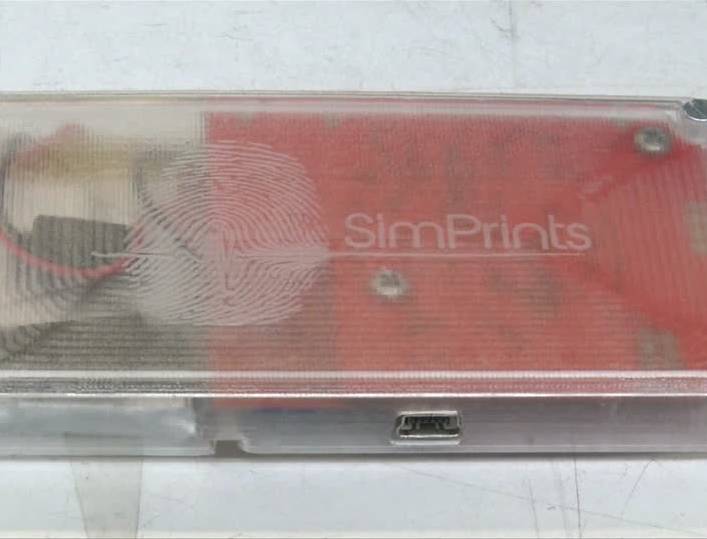
British postgraduate students have devised a pocket-sized fingerprint scanner designed to help patients in the developing world get improved access to healthcare.
 |
British postgraduate students have devised a pocket-sized fingerprint scanner designed to help patients in the developing world get improved access to healthcare.
Toby Norman, Daniel Storisteanu, and Alexandra Grigore hooked up with Toby's brother Tristram to create Simprints, a scanner that gives health workers easy access to the medical records of patients in the developing world.
According to Toby Norman, the quartet originally wanted to devise software using existing fingerprint scanners, but realized that none on the market fitted the bill.
He said: "When we first started we thought this would simply be a software problem - we'd buy an off-the-shelf fingerprint scanner, write a bit of software, connect it to a mobile phone, and that would solve the problem. However, when we looked at the applications out there we found that most scanners out there were designed for westernized applications, designed for office use, commercial use, criminal justice, to applications like that. What we actually needed was a scanner that is low cost, ruggedised, wireless, low energy, and could work well in difficult field conditions."
The scanner wirelessly syncs with a health worker's smartphone via an app to check patient records. The SimPrints system can access and modify offline health records that have already been downloaded and stored in a local database on the phone. This means that in areas with limited mobile connectivity, updates to the records will subsequently be synced with the central database once Internet connectivity returns.
Tristram Norman, from the Royal Holloway, University of London, said the device involved two steps that make it easy for an outreach community health worker to access patient healthcare records.
He said: "The two steps we do here are we capture the image and break this image down into a key and this key can then be transferred to an existing m-health application, so a community health worker out there will have a phone with an m-health app on it, such as ODK (open data kit), and that phone will have a database of existing records or records that they're trying to capture and will be able to use the key that we capture from their fingerprint to unlock those records, to bring those records to the foreground so they can see 'has his person been seen before? Have they been treated before? What round of medications they're currently on?' These kinds of things."
Tristram Norman says the device is easy to use. He said: "A health worker will come to the field and they'll have a phone or tablet like this and they'll say 'we're seeing these patients, we're here to provide medication, food drive,' and they'll say 'Great, swipe your fingerprint' and then they'll use this fingerprint to search the record database and say 'do you have existing medical records and can we access those?'"
He added: "The Simprints technology can integrate with any phone that currently has Bluetooth and we're focusing on the Android platform because the Android platform is the largest growing mobile platform currently in the developing world."
Currently health workers in remote areas find it hard to identify clients, who may have no birth certificate or passport, and whose records have previously been held on paper. The Simprints team believes their device will also allow health workers to better monitor vaccination levels and help civil registration records by enabling tracking of births and deaths.
The Simprints team designed five separate scanner models and have been road-testing them with NGOs (non-governmental organizations). A final choice will be made before a large-scale trial is carried out in Bangladesh next January. The pilot study will take part in partnership with BRAC and the Johns Hopkins Global m-Health Initiative in Gaibandha, district.
According to head of field testing, Storisteanu, "the next step we're going to be doing is to take five of our shortlisted sensors and test them and look at what's the best performance for global health applications."
Some challenges haven't yet been overcome, such as fingerprint identification of infants, who have fewer unique identifiers on their fingerprints, and manual laborers whose rough hands make getting a print difficult. But the team hopes their next prototype might solve this problem. In the meantime, strategies include connecting an infant's record to the fingerprints of their parents and enrolling multiple fingerprints for manual laborers - and the elderly - to increase matching accuracy.
Toby Norman insists the process is entirely secure. "Getting patient application right is absolutely essential," he said. "At Simprints we do three things to get that right. First we don't work with patient medical records, so we never store or hold access to patient data. That's all held by the organizations we work with. Second we never transmit raw fingerprint images, so we actually do the extraction process where we take a fingerprint image and turn it into a template. We do that on the scanner itself, meaning that the fingerprint image never leaves the scanner. Third we use the same level of encryptions that we use in online banking or financial transactions that secure any data that passes between the phone and the server."
The trio from Cambridge are all Gates Scholars, receiving funding from the Gates foundation set up by Microsoft guru Bill Gates and his wife Melinda to improve global healthcare. Toby Norman says that by the time of mass production - which could be within a one year - the cost of each scanner will be under 50 USD, which is the price that NGOS informed Simprints would be a game-changer.
According to Simprints, every year 1.5 million children from vaccine-preventable diseases, and the company hopes their scanner will help reduce that figure significantly.
(Source: Reuters)





